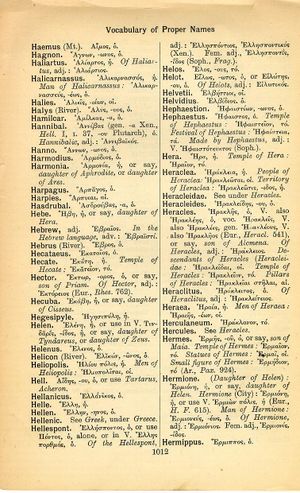Hermes
ἅπανθ' ὁ μακρὸς κἀναρίθμητος χρόνος φύει τ' ἄδηλα καὶ φανέντα κρύπτεται· κοὐκ ἔστ' ἄελπτον οὐδέν, ἀλλ' ἁλίσκεται χὠ δεινὸς ὅρκος χαἰ περισκελεῖς φρένες. → Long, unmeasurable Time brings to light everything unseen and hides what has been apparent. Nothing is beyond hope; even the fearsome oath and the most stubborn will is overcome. | All things long and countless time brings to birth in darkness and covers after they have been revealed! Nothing is beyond expectation; the dread oath and the unflinching purpose can be overcome.
English > Greek (Woodhouse)
Ἑρμῆς -οῦ, ὁ, or say, son of Maia.
Temple of Hermes: Ἑρμαῖον, τό.
Statues of Hermes: Ἑρμαῖ, οἱ.
Small figure of Hermes: Ἑρμήδιον, τό (Ar., Pax. 924).
Latin > English (Lewis & Short)
Hermes: or Herma, ae, m., = Ἑρμῆς (Hermes, Mercury; hence transf., cf. Liddell and Scott under Ἑρμῆς),
I a Hermes pillar, Hermes, a head carved on the top of a square pedestal or post; such pillars of Hermes stood, esp. in Athens, in several public places and before private houses, Macr. S. 1, 19; Serv. Verg. A. 8. 138; Nep. Alcib. 3; Cic. Leg. 2, 26, 65; id. Att. 1, 8, 2; Juv. 8, 53.—
II Deriv.: Hermae-um, i, n., a temple of Hercules, Hermœum.
A The name of a summer-house: in diaetam, cui nomen est Hermaeum, recesserat, Suet. Claud. 10.—
B A frontier town of Bœotia, over against Eubœa, Liv. 35, 50, 9.
Latin > French (Gaffiot 2016)
Hermēs¹⁴ (Herma), æ, m. (Ἑρμῆς),
1 Hermès ou Mercure || Hermæ, ārum, pl., Hermès, gaines surmontées d’une tête de Mercure ; [en gén.] bustes : Cic. Leg. 2, 65 ; Att. 1, 8, 2
2 Hermes Trismegistus, m., Hermès Trismégiste [dieu ou sage égyptien] : Lact. Inst. 1, 6, ou Trimaximus Amm. 21, 14, 15
3 nom d’hommes : Mart. 5, 24 ; 10, 56, 7.
Latin > German (Georges)
Hermēs (Herma), ae, m. (Ἑρμης, der Gott Hermes), I) jede Büste, die in einen viereckigen Fußpfeiler od. in eine Säule auslief, eine Herme, wie sie bes. in Athen auf mehreren öffentlichen Plätzen und vor den Eingängen der Tempel und Häuser standen, Cic. ad Att. 1, 8, 2. Nep. Alcib. 3, 2 (an beiden Stellen Plur. Hermae): dafür truncus Hermae, Iuven. 8, 53. – II) Hermes Trimaximus (= Τριςμέγιστος, Beiname des ägyptischen Hermes), ein Schriftsteller des 2. Jahrh. nach Chr., der altägyptischen, pythagorëischen u. platonischen Ideen wieder Eingang zu verschaffen suchte, Amm. 21, 14, 5.

